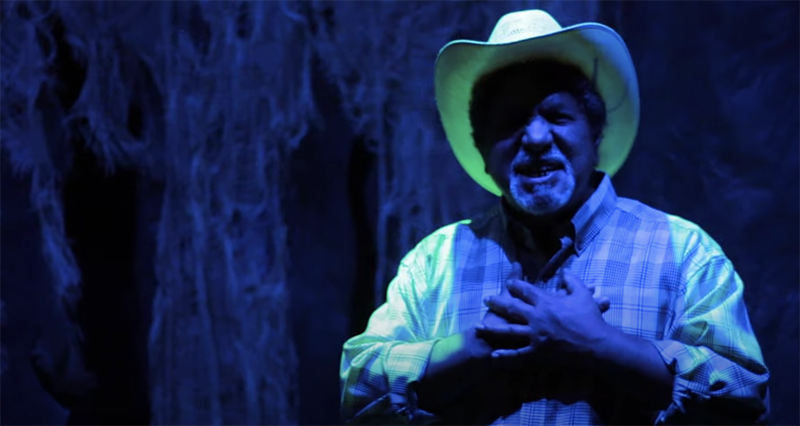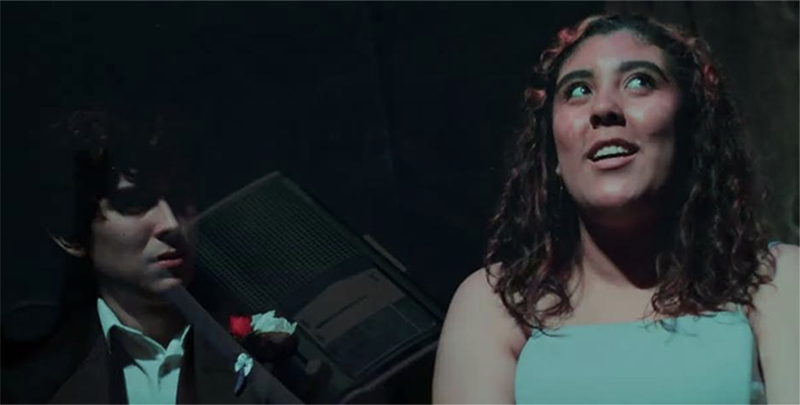Gentle guitar chords and pools of multi-colored light fill the air as audiences enter the Station Theatre. The stage is littered with the detritus of an abandoned former party spot, while the walls are draped with ragged, semi-transparent fabric: obscuring entrances, exits, and potential hiding spots. Surreal mystery and stark reality both exist in Borderline. This new production by Andrew Siañez-De La O, made by and for Latine* creators, uses dreamlike allegory in concert with dialogue as natural as breathing. Borderline, directed by Jackie Obando Carter, weaves epic narration, parable style, with the tangible, realistic fears of four young people in a hostile world. *(Gender-neutral language for Latino/Latina can be expressed in a few ways; this author has opted for Latine after consulting sources here, here, and here.)
A man with eyes shaded from a cowboy hat, Tío Ofelio, begins the prologue, appropriately enough, with an origin story. Told to him by his mother, an ancient Mexican myth, it introduces the truth of how we shape the stories we tell. His tale mirrors his mamá: “A little true, a little false, but completely her.” Dynamically portrayed by Davíd González, Ofelio threads together each scene, deliberately weaving his tale, despite increasing signs of stress and desperation. Underscored by original music by Joe Reichlin, Tío Ofelio warns of oncoming darkness while emphasizing that only family and belonging can heal. Haunted as well as haunting, González shows the pain of transformation caused by first experiencing, then creating evil.
As much as Borderline is a fable, so too is it a raw, realistic coming-of-age tale. Grounded in the harsh realities of the world, two unaccompanied youngsters dash onto the scene, Enzo and Rosita. The chemistry between brother and sister is immediately apparent, with casual affection and organic banter. Played by actual siblings, Elián Carrillo and Elena Sofía Carrillo, respectively, Enzo and Rosita prove to have storytelling chops of their own. Writing a horror story, the siblings collaborate, Enzo excitedly dictating, with Rosita advising and writing. Despite their youth, they demonstrate a deep understanding of fear. From werewolves to chupacabras, the theme of the boogeymen in our world permeates the narrative. Unfortunately for the young siblings, they are hunted by real danger: the border patrol, la migra, them.
The other adolescent pair in the Bildungsroman of Borderline are Veronica and Tony, two enamored teens, fresh from their homecoming dance. Despite their initial giddy giggling, the young couple undoubtedly has important matters on their mind, an unusual awkward void between them. Noé Cornejo Herrera brings charm and vulnerability to the initially boisterous, blustering Tony, as Ines Garcia-Valdivia’s Veró exudes whip-sharp wit, fierce protectiveness, and practical street-smarts. When their romantic desert jaunt collides with Enzo and Rosita, the teens struggle to wrangle and guard the siblings, as deafening helicopters, strange green lights, and the ever-present “them” circle the group.
Language matters in Borderline, particularly in the split between us and them. The gap between worlds is painfully apparent, as the Rio, a symbol of life, is described as a wound. The pain of the border is clear, as character after character reveals their separation from family and a sense of home. Beginning in El Paso, TX, in 2017, apprehended families fleeing to the U.S. were separated at the border or evacuated to unsafe areas. The pejorative “alien” is explored to the full extent, with machines of subjugation circling overhead and UFOs derided as absurd. Veronica’s affectionate nickname of “Ponyboy” for Tony evokes the seminal novel The Outsiders, as the immigrant children struggle to find their place in the world. Otherized, marginalized, and underserved, these unique characters feel at home in our own community, where, sadly, they may still be seen as outsiders.

Photo still from the Borderline trailer.
Borderline is a play about the darkness that isolation and villainization bring, and the light (and music) that fight it away. As director Jackie Obando Carter points out, “Go back enough generations, and everyone has an immigrant story.” Despite being approximately 18 percent of the U.S. population, there is a dearth of stories from the unique perspective of Latin Americans, many of Borderline’s actors portraying their heritage for the first time. Carter continues, “I’ve loved the opportunity […] to give a voice to those who haven’t had the opportunity to have their story heard.” The stellar and heart-wrenching portrayals of the young people are more than worth the price of admission, as are the gripping and natural monologues by Siañez-De La O. Borderline’s clever analogies, use of surrealism, and chemistry between actors remind us of our own histories, and the role we take in today’s story.
“Stay in touch, mi familia. Listen closely. Stay safe.”
Performance length is approximately 100 minutes with no intermission. Production contains flashing lights, mild profanity, and mature themes.
The Station Theatre has also added two livestream options for Friday and Saturday nights at 7:25 PM. Livestream tickets purchased for those nights can be used to watch the video any time during or after the performance.
Borderline
Through – May 8, 2022
T – Sa 7:30 p.m.
Su 3:30 p.m.
Station Theatre
223 N Broadway Ave
Urbana
$10 – $15; purchase tickets online








